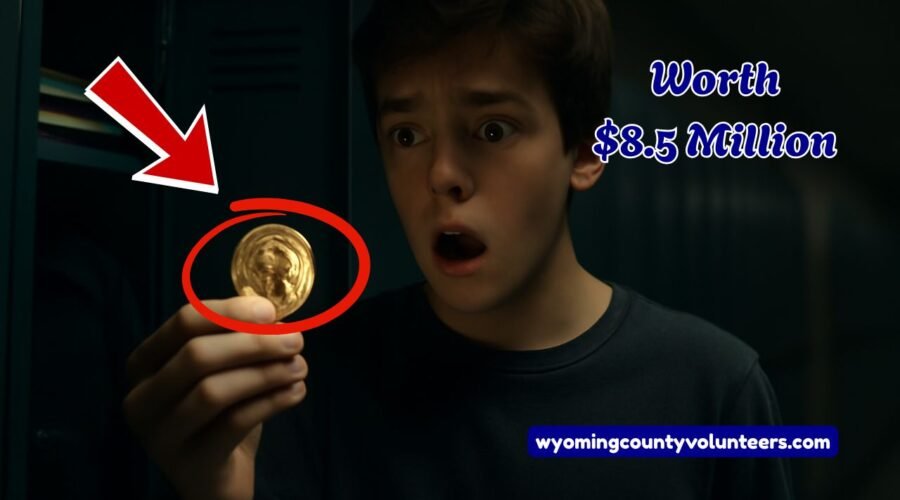Sacagawea Dollar Found In School Locker Rekindles Public Interest
Imagine opening an old school locker after many years and finding not just notebooks, but a shiny golden coin. That is exactly what happened when someone discovered a Sacagawea Dollar hidden away. This coin is not only money but also a piece of American history and childhood memories.
For many, it brings back the early 2000s when these coins were new and exciting. Let’s explore why this coin is special, how much it is worth, and why collectors still search for it today.
What Is A Sacagawea Dollar?
The Sacagawea Dollar, also known as the Golden Dollar, was first released in the year 2000. On the front, it shows Sacagawea, a Shoshone woman who helped Lewis and Clark during their journey of exploration. She is shown carrying her baby son.
The coin looks golden, but it is not real gold. It has a copper core covered with a manganese brass finish that gives it a bright shine.
Why Was It Created?
Before the Sacagawea Dollar, there was the Susan B. Anthony Dollar, but it was not popular. People often confused it with quarters. The U.S. Mint introduced the Sacagawea Dollar to make dollar coins more attractive and easier to use.
Between 2000 and 2008, millions of these coins were made. Later, the design became part of the Native American $1 Coin Program, which shows different Native American themes each year.
Why Finding One Feels Special Today
In the early 2000s, Sacagawea Dollars were common. But soon people stopped using them, and most coins ended up in collections, jars, or forgotten places.
That is why finding one today feels like discovering a time capsule. It reminds people of childhood, old memories, and America’s effort to bring dollar coins back into daily life.
Are Sacagawea Dollars Valuable?
Most Sacagawea Dollars are only worth $1, but some rare ones can be worth hundreds or even thousands of dollars.
For example:
- The 2000-P “Cheerios Dollar”, given in cereal boxes, has special eagle feathers and can sell for $5,000–$10,000 or more.
- The Goodacre Presentation Coins are also valuable because they were specially prepared and signed.
Types Of Sacagawea Dollars And Their Values
Here is a simple table to understand the main types and their approximate values:
| Type / Year | Feature | Value Range |
|---|---|---|
| 2000-P Regular Issue | Common circulation coin | $1 – $3 |
| 2000-P Cheerios Dollar | Enhanced eagle tail feathers | $5,000 – $10,000+ |
| 2000-P Goodacre Version | Special presentation coins | $500 – $3,000 |
| 2007–2008 Issues | Lower mintages | $1 – $15 |
| Native American $1 Series | Annual changing reverse | $1 – $20+ |
Fun Facts About Sacagawea Dollars
- Over 1 billion coins were made in the year 2000 alone.
- Since 2009, the words “In God We Trust” are placed on the coin’s edge.
- Special proof coins from San Francisco are shiny and loved by collectors.
Pros And Cons Of Sacagawea Dollars
| Pros | Cons |
|---|---|
| Golden appearance | Not widely used in stores |
| Celebrates Native history | Sometimes mistaken for tokens |
| Rare types worth thousands | Most worth only $1 |
Collector Tips And Insights
- Always look for the 2000-P Cheerios Dollar; it is the rarest and most valuable.
- Keep coins in protective holders so they don’t lose shine.
- Check mintmarks (P, D, S) since proof coins and special strikes are worth more.
Finding a Sacagawea Dollar in a school locker is more than just a surprise—it is like opening a small treasure chest of history. This coin connects us to America’s past, Native heritage, and a bold experiment to bring back dollar coins.
While most are worth only a dollar, rare ones like the Cheerios Dollar can reach thousands of dollars. So if you ever come across one, don’t spend it right away—it might just be your hidden treasure.
FAQs
Are Sacagawea Dollars still made?
Yes, but only for collectors. Since 2009, they are part of the Native American $1 Coin Program.
Can I spend a Sacagawea Dollar?
Yes, it is legal money. But many people keep them in collections instead.
What is the rarest Sacagawea Dollar?
The 2000-P Cheerios Dollar, which can sell for thousands at auctions.


Leave a Reply